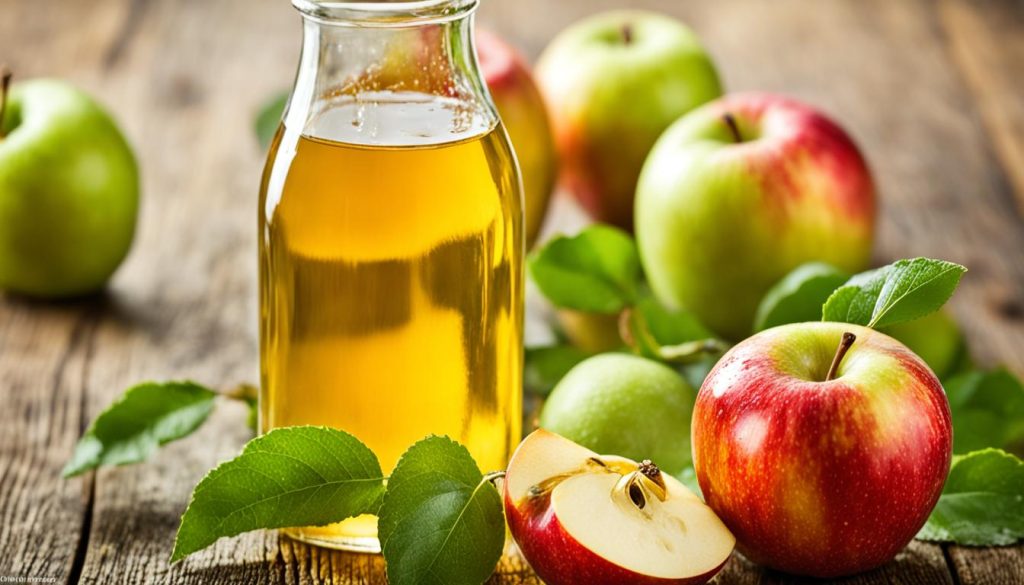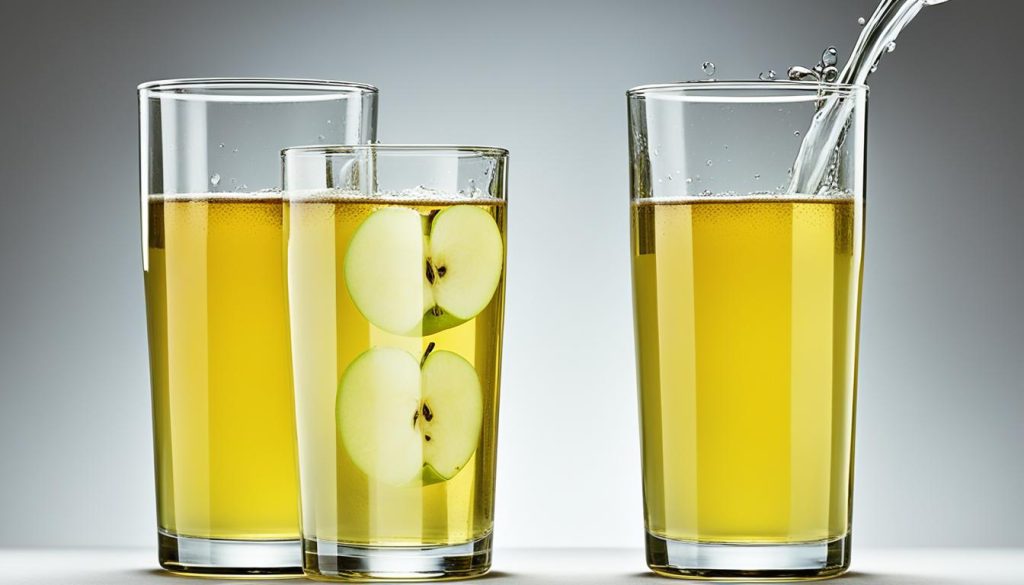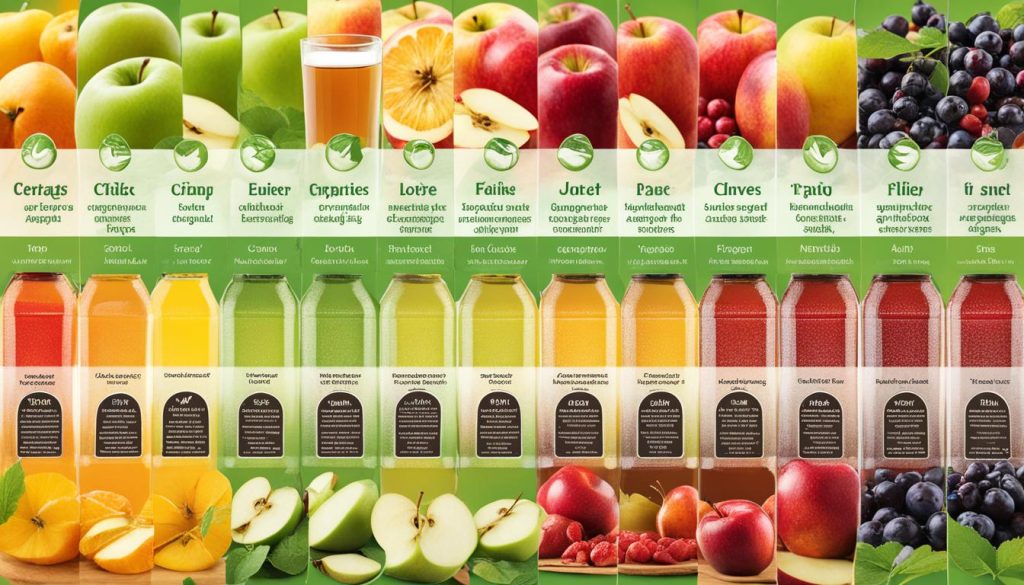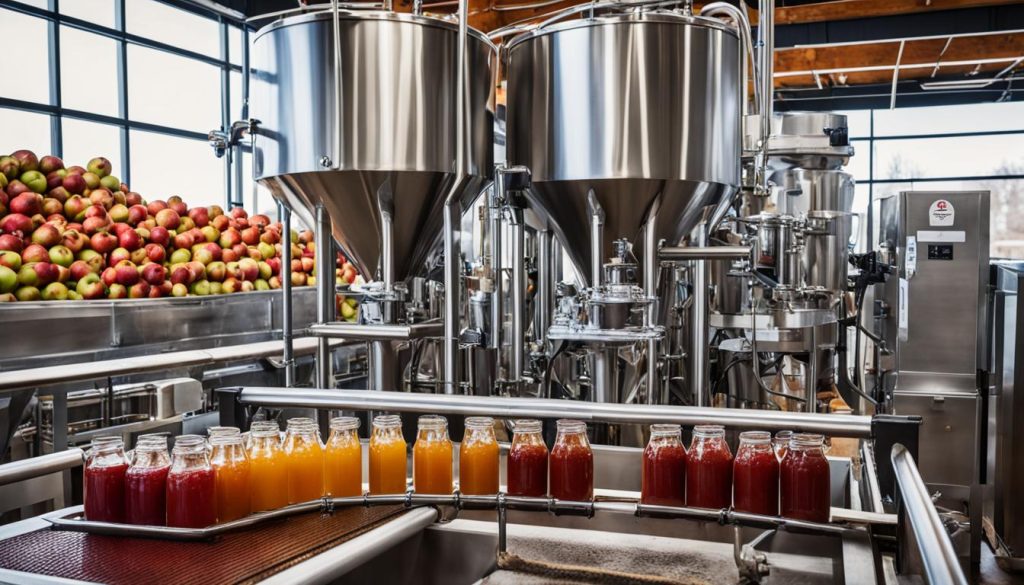Apple juice and apple cider – two popular apple-based beverages that are often enjoyed during the fall season. You may have wondered, what exactly is the difference between the two? Are they simply interchangeable terms? Or do they have distinct characteristics and processing methods? Let’s dive in and uncover the truth about apple juice and apple cider.
Before we unveil the answer, picture this: a glass of golden apple juice, translucent and refreshing, versus a glass of dark apple cider, more opaque and full of natural apple pulp and sediment. The visuals alone spark curiosity about their differences, don’t they?
Now, prepare to have your misconceptions challenged and your knowledge expanded. From their processing to their taste profiles, apple juice and apple cider have unique qualities that set them apart. So, are you ready to unravel the intriguing details that lie within? Let’s find out!
What is Apple Juice?
Apple juice is a popular beverage made from fresh apples. It is created through a process that involves pressing the apples to extract their juice. The extracted juice is then carefully filtered to remove any solids or impurities. To ensure stability and extend its shelf life, apple juice is typically pasteurized and may also contain added preservatives. This helps maintain the freshness and quality of the juice over time.
Apple juice is known for its translucent appearance and light, golden color. The clarity of the juice is a result of the filtration process, which removes any particles or sediment that may be present in the initial extraction. The smooth texture and refreshing taste of apple juice make it a popular choice for both children and adults alike. It is commonly enjoyed as a standalone beverage or used as an ingredient in various recipes, such as smoothies, cocktails, and baked goods.
Benefits of Apple Juice
Apple juice offers several potential health benefits due to its natural composition. Fresh apples, the main ingredient in apple juice, are rich in essential vitamins, minerals, and antioxidants. These nutrients contribute to supporting immune function, promoting good digestion, and maintaining overall health and well-being.
- Vitamin C: Apple juice is a good source of vitamin C, a nutrient known for its immune-boosting properties. Vitamin C helps protect the body against harmful pathogens and may reduce the severity and duration of common illnesses, such as the common cold.
- Antioxidants: Apples contain a variety of antioxidants, including flavonoids and polyphenols, which help combat oxidative stress and inflammation in the body. These antioxidants have been linked to a reduced risk of chronic diseases, such as heart disease and certain types of cancer.
- Hydration: Apple juice is a hydrating beverage that can help replenish fluids in the body. Staying hydrated is essential for maintaining energy levels, supporting healthy organ function, and promoting overall well-being.
It’s important to note that while apple juice offers potential health benefits, it should be consumed in moderation due to its natural sugar content. Some commercially available apple juices may also contain added sugars, which can contribute to excess calorie intake. Opting for homemade apple juice or choosing varieties without added sugars can help maximize the nutritional value of this refreshing beverage.

What is Apple Cider?
Apple cider is a delicious and refreshing beverage made from pressed fresh apples. Unlike apple juice, which undergoes filtration and pasteurization, apple cider is unfiltered and raw, allowing it to retain the natural pulp and sediment from the fruit. This gives apple cider a unique and slightly cloudy appearance.
Apple cider is typically unpasteurized and does not contain added sugar or preservatives, making it a more natural and wholesome choice.
With its darker color and slightly opaque appearance, apple cider stands apart from its counterpart, apple juice. The natural variation in apple cider can result in a slightly tangy or tart taste, which some people find especially appealing. It’s the perfect balance of sweetness and acidity that makes apple cider a beloved choice, particularly during the autumn season when apples are harvested and the aroma of freshly pressed cider fills the air.
Apple cider is a versatile beverage that can be enjoyed hot or cold, perfect for sipping on a crisp fall day or incorporating into warm, spiced recipes.
Whether you prefer enjoying a glass of cold apple cider or using it as a flavorful ingredient in cocktails or sauces, apple cider offers a delightful and distinct flavor profile that sets it apart from apple juice.
The Process of Making Apple Cider
The production of apple cider starts with freshly harvested apples. The apples are washed, crushed, and pressed to extract the juice. But unlike apple juice, which goes through a filtration process to remove solids, apple cider retains the natural pulp and sediment. This gives apple cider its unique texture and flavor.
Since apple cider is typically consumed within a relatively short timeframe, it is often left unpasteurized. This retains the cider’s fresh and vibrant taste, as well as potential health benefits associated with the natural enzymes and nutrients found in the raw juice.
It’s important to note that due to its raw and unfiltered nature, apple cider may contain traces of bacteria, so it’s recommended to consume it fresh and refrigerated or heat it to a safe temperature before enjoying.
What is the Difference Between Apple Juice and Apple Cider?
The main difference between apple juice and apple cider lies in their processing and characteristics. Apple juice undergoes filtration to remove solids and is pasteurized for longer shelf life. It is typically clearer in appearance and may have a smoother texture due to the removal of pulp. On the other hand, apple cider is unfiltered, meaning it retains the natural pulp and sediment from the pressed apples. It is often darker, more opaque, and may have residue at the bottom. Apple cider also has a shorter shelf life due to the lack of preservatives. Over time, apple cider can ferment into apple cider vinegar or alcoholic cider.
Comparison Table: Apple Juice vs Apple Cider
| Characteristic | Apple Juice | Apple Cider |
|---|---|---|
| Filtration and Pasteurization | Yes | No |
| Pulp Content | Low | High |
| Color | Light, golden | Darker, more opaque |
| Residue at the bottom | No | Yes |
| Shelf Life | Longer | Shorter |
| Possibility of Fermentation | No | Yes |
As shown in the comparison table above, apple juice and apple cider differ in terms of filtration, pulp content, color, residue, shelf life, and the potential for fermentation.

By understanding these differences, you can make an informed choice when deciding between apple juice and apple cider for your personal preferences or recipe needs.
Benefits of Apple Juice and Apple Cider
Both apple juice and apple cider offer numerous health benefits due to their nutritional value. Made from fresh apples, these beverages are packed with essential vitamins, minerals, and antioxidants that promote overall well-being.
1. Hydration and Vitamin C
Apple juice and apple cider are hydrating beverages that can quench your thirst and keep you refreshed. Additionally, they are excellent sources of vitamin C, which plays a vital role in supporting the immune system and promoting collagen production.
2. Rich in Antioxidants
Apples are known for their high antioxidant content, and this is true for both apple juice and apple cider. Antioxidants help protect the body against oxidative stress and reduce the risk of chronic diseases. These compounds also have anti-inflammatory properties that support overall health.
3. Digestive Health
Drinking apple juice or apple cider may aid digestion by promoting regular bowel movements. Apple cider, in particular, contains natural fibers and pectin from the apple pulp, which can support healthy digestion and prevent constipation.
4. Potential Health Benefits
Research suggests that apple juice and apple cider may have several potential health benefits. The antioxidants present in these beverages have been linked to a reduced risk of heart disease and certain types of cancer. Additionally, the high fiber content in apple cider may help lower cholesterol levels and improve gut health.
Choosing the Healthiest Option
When selecting apple juice or apple cider, it’s important to consider the nutritional value. Apple juice often contains added sugars, which can increase its calorie content and contribute to health issues such as obesity. Opting for varieties without added sugars or making homemade versions can help maximize the nutritional benefits.
Moreover, apple cider typically retains more of the apple’s natural pulp, making it a healthier choice with higher fiber content. Homemade apple cider, when freshly made from quality apples, can provide an even richer nutritional profile compared to store-bought apple juice.
By incorporating apple juice and apple cider into your diet, you can enjoy their delicious flavors while reaping their health benefits. Remember to consume them in moderation and as part of a balanced diet to optimize their potential advantages.

How Apple Juice and Apple Cider are Made?
Both apple juice and apple cider are made from fresh apples, but they undergo different processing methods to create distinct beverages.
1. Apple Juice Processing
Apple juice is made by washing, crushing, and pressing fresh apples to extract their juice. The extracted juice then undergoes a filtration process to remove any solids or pulp. This filtration helps create a clear and smooth juice. The juice is also pasteurized to ensure its stability and prolong its shelf life. During pasteurization, the apple juice is heated to kill any harmful bacteria or microorganisms. Sweeteners and preservatives may be added to enhance the taste and ensure the juice remains fresh for a longer period.
2. Apple Cider Processing
Apple cider is made using a similar process, starting with washing and crushing fresh apples. However, unlike apple juice, apple cider retains the natural pulp and sediment from the apples and does not go through filtration. This gives apple cider its characteristic cloudy appearance and a more robust flavor compared to apple juice. Additionally, apple cider is often left unpasteurized, as pasteurization would remove the natural enzymes and flavors associated with raw apple cider. Since apple cider is unfiltered and unpasteurized, it has a shorter shelf life and needs to be consumed within a few days.
Here’s a visual representation of the processing methods for apple juice and apple cider:

| Processing Steps | Characteristics | Shelf Life | |
|---|---|---|---|
| Apple Juice | Wash, crush, press, filter, pasteurize | Clear, smooth, translucent | Longer shelf life due to pasteurization and preservatives |
| Apple Cider | Wash, crush, press, unfiltered, unpasteurized | Cloudy, robust, opaque | Shorter shelf life due to lack of pasteurization and preservatives |
It’s worth noting that the choice between homemade apple cider and store-bought apple juice depends on personal preference and desired qualities. Homemade apple cider offers a more authentic and rustic experience with its unfiltered and unpasteurized nature. On the other hand, store-bought apple juice provides convenience, longer shelf life, and a clearer appearance.
Conclusion
When it comes to choosing between homemade apple cider and store-bought apple juice, it ultimately boils down to personal preference. Apple juice, with its clear appearance and sweeter taste, is a popular choice for those who prefer a lighter and smoother beverage. With longer shelf life due to processing methods, it provides convenience and accessibility.
On the other hand, apple cider offers a more robust and earthy flavor, thanks to its unfiltered nature that retains more of the apple’s natural characteristics. It’s the perfect option for those seeking a unique and authentic apple experience. Homemade apple cider, in particular, takes it a step further by offering a fresher taste and the opportunity to experiment with different apple varieties and flavor combinations.
Ultimately, both homemade apple cider and store-bought apple juice have their merits. Apple cider provides a more authentic and complex flavor profile, while apple juice offers a lighter and more refreshing taste. Whether you choose one over the other depends on your personal taste preferences and the specific beverage experience you’re seeking. So go ahead, savor the apple goodness and enjoy whichever option brings you the most delight!




